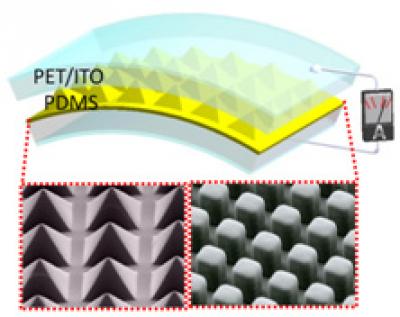Georgia Institute of Technology researchers have developed a flexible triboelectric generator based on the principle of generating electricity by rubbing two different plastic materials. This generator can produce alternating current from motion.
 This diagram shows a new high-output, flexible and transparent trioboelectric nanogenerator produced from transparent polymer materials. (Image courtesy of Zhong Lin Wang)
This diagram shows a new high-output, flexible and transparent trioboelectric nanogenerator produced from transparent polymer materials. (Image courtesy of Zhong Lin Wang)
The triboelectric generator involves the rubbing of a polyester sheet against a polydimethysiloxane (PDMS) sheet. In this process, electrons are transferred from the polyester to the PDMS. Soon afterwards, the polymer materials are mechanically isolated, forming an air gap that separates the charge on the surface of the PDMS to create a dipole moment.
When the two surfaces are connected to an electrical load, the charge potential gets equalized through the flow of a small current. The repetition of rubbing action and consequent separation makes the generator to produce a small alternating current. The rubbing motion is created with the help of an external deformation that presses and slides the polymer surfaces.
The gap separation technique finds use in the development of ultrasensitive self-powered active pressure sensor applied in opto-electronic or organic electronic systems. The force created by the falling of a feather or water droplet on the triboelectric generator surface creates a small current, which can be measured to detect the contact. The sensor is capable of detecting pressure down to 13 mPa. Since these sensors can be fabricated as nearly 75% transparent, they are ideal replacement for current sensors.
To improve the current generation, the research team has used micro-patterned surfaces such as pyramids, cubes and lines. What the team found is that pyramid shapes are capable of generating more electrical current: up to 18 V at around 0.13 mA/cm2. To create the triboelectric generators, the research team first formed a mold using a silicon wafer over which the friction-improving patterns are created utilizing conventional photolithography and a dry or wet etching process. The team then subjected the molds to a chemical treatment to avoid the PDMS from sticking.
The researchers then mixed the liquid PDMS elastomer and cross-linker and spin-coated them over the mold for thermal curing, which resulted in a thin PDMS film. They then fixed this patterned PDMS film onto a polyethylene terephthalate (PET)-coated, indium tin oxide (ITO)-made electrode surface using a thin PDMS bonding layer, and then created a sandwich structure by encapsulating the whole structure with another ITO-coated PET film.
According to Zhong Lin Wang, one of the researchers, the entire fabrication process is easy, scalable and economical. The generators are able to produce current even after 100,000 cycles of operation. The triboelectric generator can be used in parallel with zinc oxide nanowire-based nanogenerators to augment power generation.